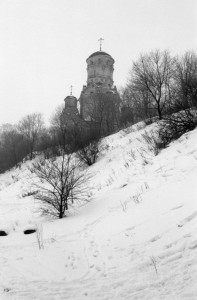 Here’s a must-read in the FT that sheds yet more light on Putin’s relationship with the Russian Orthodox Church:
Here’s a must-read in the FT that sheds yet more light on Putin’s relationship with the Russian Orthodox Church:
…Father Tikhon wields influence in the church far above his modest rank of Archimandrite, or abbot, due primarily to his contacts in the Kremlin. The story that travels with him, which he will neither confirm nor deny, is that he is the confessor to Vladimir Putin. The only details he gives is that Putin, sometime before he became president at the end of 1999 (most likely while he was head of Russia’s FSB security service from 1998 to 1999) appeared at the doors of the monastery one day. Since then, the two men have maintained a very public association, with Tikhon accompanying Putin on foreign and domestic trips, dealing with ecclesiastical problems. But according to persistent rumour, Tikhon ushered the former KGB colonel into the Orthodox faith and became his dukhovnik, or godfather.
Father Tikhon does appear to have a very intimate knowledge of Putin’s religious life: in 2001 he gave an intriguing interview to a Greek newspaper, saying Putin “really is an Orthodox Christian, and not just nominally, but a person who makes confession, takes communion and understands his responsibility before God for the high service entrusted to him and for his immortal soul”.
He also would appear to have influence – he has campaigned almost single-handedly for anti-alcohol legislation in Russia, and achieved surprising results: just before the New Year, Russia’s parliament banned alcohol sales after 11pm…
…A secular state according to its 1993 constitution, Russia recently flirted precariously with religious law in last year’s strange prosecution of punk band Pussy Riot, which transformed them into global martyrs after they were given two-year prison sentences (one has since been set free), guilty of “hooliganism motivated by religious hatred”.
Prosecution documents state that the laws broken by the three defendants – who performed “Blessed Virgin, throw Putin Out!” wearing Day-Glo balaclavas in Moscow’s Christ the Saviour cathedral – were articles 62 and 75 of the Quinisext Council, held under the emperor Justinian in the seventh century. According to these articles, access to the solea and pulpit of Orthodox churches is reserved for clergy. While the final sentence by the judge in the case dropped references to the Quinisext Council, it did cite as expert opinion the fourth-century Council of Laodicea, according to which: “The solea and ambon have special religious significance for believers.”…“The Russian church created Russia,” says Father Tikhon. “Russia can sometimes be an obedient child, and sometimes a child that revolts against its parents. But the church always has felt responsibility for Russia.”
No wonder Pussy Riot headed for the cathedral…
